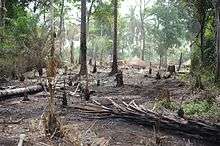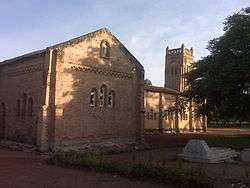Doruma
| Doruma | |
|---|---|
| Town | |
|
The church in Doruma, home to the Roman Catholic Diocese of Doruma–Dungu. | |
 Doruma Location in Democratic Republic of the Congo | |
| Coordinates: 4°44′N 27°42′E / 4.733°N 27.700°E | |
| Country | Democratic Republic of the Congo |
| Province | Orientale |
| District | Haut-Uele District |
| Population (2005) | |
| • Total | 18,000 (inhabitants & IDPs) |
| Climate | Aw |
| National language | Lingala |
Doruma is a city in the northeastern regions of the Haut-Uele District, Orientale Province in the Democratic Republic of the Congo.
It is near the border with South Sudan.
History
The origin of the name Doruma comes from the name Ndoromo or Ndolomo, which is the name of the Azande King who ruled the people in that area prior to the arrival of the Belgian colonialists. Doruma is known for its natural vegetations, especially its thick forests, exotic wild animals and birds. The town is a major supplier of palm oil to nearby towns; such as Ezo, Nzara and Yambio. Doruma is also known for its fragrance rice and delicious oranged-coloured mushrooms which the locals call 'Rute-Mbiro'.
During the later part of December 1990, Doruma became a hosting town for Sudanese refugees who were fleeing a civil war which had reached the towns of Maridi, Yambio, Ezo and Tambura. In 1992, the UNHCR in agreement with the Prince of Doruma and other governmental authority opened the Nambasa Refugees Camp. This camp was situated some several kilometres southward of Doruma town, and it remained opened until October 1998, when the-then rebels of Sudan, SPLA, took advantages of the war which was going on in DRC at the time and entered both the Doruma and Dungu towns.
The SPLA faced little resistance as most of the AFDL soldiers had been transported to the battle front lines such as in Kisangani and other major towns. The rebels SPLA came and told the population that the government of Congo under Laurent Desire Kabila was collaborating with the Sudanese government to transport Sudanese soldiers direct from Khartoum all the way to Dungu and Doruma in order to retake the towns that they had lost. While still in the towns, the SPLA robbed and looted the Catholic Diocese of Dungu-Doruma. They looted the diocese vehicles, motorcycles, bikes and any thing they found valuable. They also forcefully took all the refugees back with them to Sudan. Those refugees who didn't want to return back to a war zone Sudan had to sought a refuge again this time in to the Central African Republic territory. Because these refugees were not only under pressure from the rebels SPLA, but they were also facing the threat of harm at the hands of the Congolese population; who at the time took their anger upon the refugees and blamed them for being the reason why the SPLA rebels came to Doruma and Dungu towns.
The people of Dungu and Doruma in recent times have fallen victims to Joseph Kony's Lord's Resistance Army (LRA) killing of civilians, house burning and rape.
For many years, in the Haut Uélé District of DR Congo, the LRA rebel group has plundered villages. Since December 2008, the Ugandan Army has supported the Congolese Army in eradicating such rebel groups. Following a strong military action from the army, rebels dispersed in the region yet continued to plunder villages in smaller numbers. This, in turn, has caused panic and sparked residents to seek refuge in the bush, a phenomenon exemplified in towns like Dungu and Doruma, or even farther south.

Since the end of December 2008, the LRA has come closer to Doruma, and its strategy shifted from the plunder of villages to kidnapping 11- to 17-year-old children to enlist as child-soldiers, to the mere massacre of local populations. 189 dead and 111 missing people have been reported before 24 December 2008, along with reports of tortured children and fires in the bush and fields, preventing the population from running away.
In such a context, the town of Doruma, protected by the Congolese and Ugandan armies, and normally hosting around 6,000 inhabitants, came to host in one month more than 17,000 Internally Displaced Persons (IDPs) from neighbouring locations, arriving deprived from any personal belonging.
Transportation
The town is served by Doruma Airport.[1]
Healthcare
As of March 2012 there was a hospital located in Doruma.[2]
References
- ↑ Airport information for FZJD at Great Circle Mapper.
- ↑ INTERSOS, March 26, 2012, "Archived copy". Archived from the original on 2014-10-16. Retrieved 2014-10-11.
Coordinates: 4°44′N 27°42′E / 4.733°N 27.700°E
